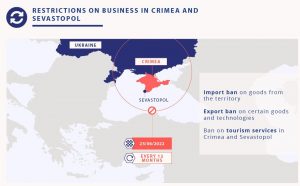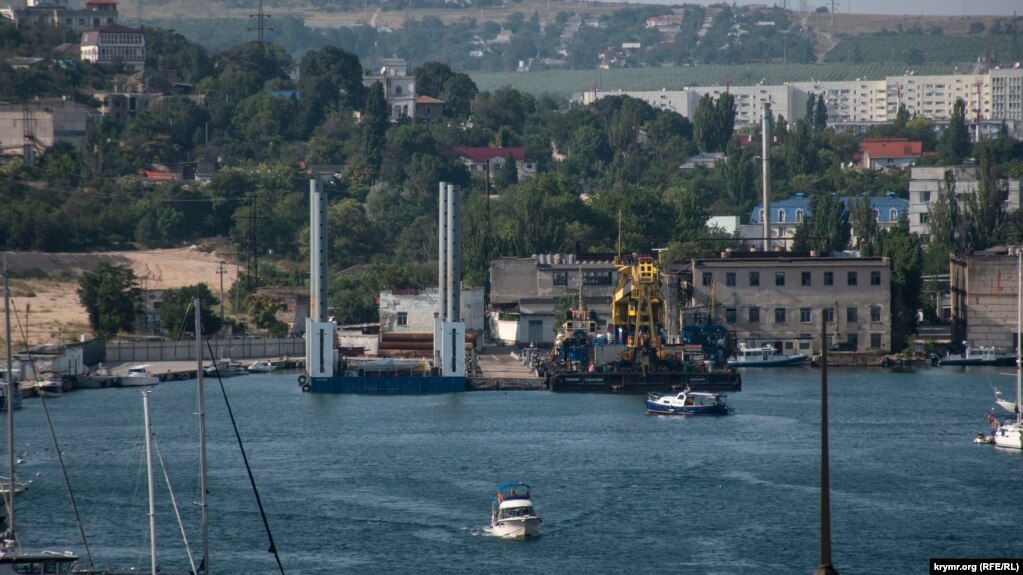Amid the preparations for the construction of a yacht marina in Balaklava Bay (Sevastopol, the southwest of the Russian-occupied Crimean peninsula, - Ed.), a special self-elevating platform RCP-450, manufactured in Europe, carries out geological exploration of the seabed. According to local media reports, the platform has been in the water area of the bay for several weeks now, while it is uknown which organization the platform belongs to and how the piece of equipment got into the territory under Western sanctions.

The Russian occupation of Ukraine's Crimean peninsula started in late February 2014 as unmarked Russian troops seized the buildings of local parliament and government in Simferopol, the capital of Crimea, later taking full control of the peninsula.
Then a so-called referendum unrecognized by most world countries was carried out on the status of the peninsula. On March 18, Russia officially annexed Crimea, which resulted in a number of international sanctions against Russia. Particularly, the EU put on restrictions for EU companies on making business in the Russian-occupied Crimea.
Made in Europe
The platform RCP-450 spotted by local media is designed for geological research and construction work in the water area of various water bodies; it can operate at depths of up to 32 meters with a maximum length of retractable supports of 48 meters.
Such RCP-type platforms are manufactured by the Dutch company Ravestein Container Pontoon at the shipyard in Deest, the Netherlands. RCP was founded in 1988 and specializes in the construction of a wide range of modular vessels and structures such as flat top barges, self-elevating barges, and dredging equipment.
The seller of the Ravenstein RCP-450 jack-up platform in Russia is the GP Papenburg International GmbH company, which is part of the German concern GP Papenburg. Note the spelling difference: it is Ravestein on the Dutch manufacturer website, but the Russian seller adds the letter N - Ravenstein - on its Russian-language website.
The Russian representative office of GP Papenburg International GmbH is located in Moscow at 4/2, Urzhumskaya. The representative in Russia and CIS countries is Evgeny Rudenko, the sales manager in Eastern Europe is Olga Bodyai.
According to RBC, LLC Papenburg Russland was registered
in 2013 in Moscow with Evgeny Rudenko as CEO and GP Papenburg International GMBH and LLC Papenburg Russland as founding bodies. GP Günter Papenburg AG is a group of companies from Hanover.
Another seller of the jack-up platforms RCP-250 and RCP-450 in Russia is one more Germany-linked company, ThyssenKrupp LLC from St. Petersburg. ThyssenKrupp AG is one of the largest industrial concerns in Germany, the world's largest manufacturer of high-alloy steel and metalworking machines.
Ex-chancellor's close friend and the most powerful woman in the German economy
The head of GP Günter Papenburg AG is Günter Papenburg. His companies have been active in Russia and in the former Soviet republics. Gunter Papenburg's contacts with Russian regions are impressive. One day he takes part in the International Forum and Exhibition Riverport Expo 2018 in Moscow. Another day a year later, accompanied by representatives of Lower Saxony businesses, he meets in his hometown of Hannover with a delegation of Russia's Perm Krai, headed by the region's governor, Maxim Reshetnikov.
Moreover, Mr. Papenburg is also a friend of the former German Chancellor, Gerhard Schröder. Such a close one that he was invited to the fifth wedding of the ex-chancellor.
Since September 2017, Gerhard Schröder, who held the post of Federal Chancellor of the Federal Republic of Germany from 1998 to 2005, has been the Chairman of the Board of Directors of PJSC NK Rosneft. That's why, the head of Gazprom, Alexei Miller, also flew to the wedding of his close colleague.
And then there was also present his equally close friend Matthias Warnig, Managing Director of Nord Stream AG. Warnig is a member of the boards of directors of a number of Russian state and private companies, and from 2003 to 2015 he was a member of the supervisory board of the Rossiya bank, also known as the bank of Putin's friends.
As for the ThyssenKrupp AG concern, its CEO, Martina Merz
, was named "the most powerful woman in the German economy", and Forbes ranked her 19th in the 2020 list of the most influential women in the world.
Marina for millionaires
From olden times, the Balaklava Bay attracted sailors by its favorable configuration, as several curves of its fairway protect the harbor well from sea storms, while the mountains surrounding the bay protect the coastal settlement from land winds. People had settled there since ancient times, and since the 19th century, Balaklava has been a resort and tourist center.

Militarized and restricted to the public during the Soviet era and demilitarized under Ukraine, Balaklava, following the annexation of Crimea by Russia in 2014, became a tasty morsel for Russian oligarchs. In 2016, Russian President Vladimir Putin ordered the construction of a yacht tourism center in Balaklava.
In February 2018, within the framework of the Sochi investment forum, the then Russian governor of Sevastopol, Dmitry Ovsyannikov, signed an agreement with AIP or the Agency for Infrastructure Projects LLC to attract investments in the project for the integrated development of Balaklava Bay. The total amount of money infusions required was estimated at 12 billion Russian rubles (about $200 million).
The owner of AIP is the former commander of the Russian missile forces, General Vladimir Zaritsky, rumored to be a protege of the Rotenberg brothers. The general was involved in several high-profile scandals in Crimea.
In November 2018, an open competition to design and conduct survey works for the project "Creation of a yacht marina, Sevastopol" ended up in the best bid offering 339.347 million rubles, which corresponded to the maximum contract price. The winner of the contract was Stroygazmontazh, owned by Arkady Rotenberg, who is known to be a close friend of President Putin. Earlier, Stroygazmontazh LLC was the contractor for the construction of the Kerch Bridge which put Arkady Rotenberg on the US sanctions list.
In November 2019, Rotenberg unexpectedly sold Stroygazmontazh, the largest contractor of Russian Gazprom. The new sole owner of the Stroygazmontazh company was the non-public joint-stock company Stroyinvestholding, which had been established four months earlier.
In January 2020, Glavgosexpertiza of Russia (the overseer of the Ministry of Construction's contracts, - Ed.) allowed Stroygazmontazh LLC to develop design documentation for the creation of the yacht marina. In December 2020, the Russian authorities of Sevastopol approved the planning and land surveying projects for the yacht marina in Balaklava.

Previously, a member of the Union of Architects of Sevastopol, Sergey Pushkarev
, criticized the project calling the construction of a yacht marina in an article on his organization's website, "a subjective desire, not supported by objective prerequisites."
"Balaklava Bay is a vivid example of unique natural occurrence that can be attributed to the protected historical natural dominants of the city, along with the surrounding hills and the remains of the Genoese fortress, as well as its protected zone... The project proposed for implementation radically changes the landscape of the area, devalues the basis of the main attraction of Balaklava, which is its ensemble of nature and medieval architecture," he wrote
Sergey Pushkarev is convinced that the authors of the project never took into account both environmental aspects and social ramifications,
“The creation of a yacht mooring for 600 vessels would entail the presence of a powerful repair base, which would occupy the most valuable coastal zones of the bay for public use. In general, the total loads on the territories bounded by mountains and the sea will increase many times, which is obviously unacceptable. The initiators of the project and its executors don't take into account the social background of the situation, namely, the attitude of the local population to such initiatives. Obviously, this 'yacht marina' would be an exorbitant burden for the city, would rather worsen than improve living conditions, increase social tension due to the collision of the interests of the residents of Balaklava (fishermen, sea links with beaches) with those property-wise and socially alien owners of prohibitively expensive 'cottages under sail'," Pushkarev wrote.
Needless to say, the opinion of the expert “wasn't heard.” In April 2021, President Putin, in his annual address to the Federal Assembly, said that the development of Crimean resorts, including yacht tourism, is a "priority,"
“Balaklava yacht marina is in the priority development of Russia... Crimea resorts are also in the plan of prospective development,” Vladimir Putin mentioned in his address.
Dredging and geological survey
The project of the yacht marina construction provides for dredging works to expand the area of possible "parking lots" for large yachts with a large draft. For this, before dredging, geological exploration gets carried out, using the self-elevating platform.

According to Soviet-era research, the width of the Balaklava Bay is 200-400 meters, and at its narrowest point is 45 meters, the depth is 5-10 meters in the upper reaches, up to 25 meters at the beach, and up to 35 meters the bay's the neck. A feature of the bay is being semi-enclosed and having a limited connection with the sea. The configuration of the coastline divides the bay into two parts, the southern deep-water one, connected to the open sea, and the northern shallow one, practically stagnant, more polluted being an entry point for anthropogenic effluents.
Environmentalists have already been sounding the alarm, focusing on the dangers associated with dredging.
“Many experts believe that at the bottom of the Balaklava Bay there is a layer of silt up to 19 meters deep, in which toxic chemicals left by the military could be buried. It's very dangerous to touch all these things, and not only for people but for fish, for phyto- and zooplankton. Balaklava Bay itself is a unique place where dolphins congregate in winter, but recently their number is on the decline. The dredging and construction would only have negative consequences for them,” says Crimean ecologist Margarita Litvinenko.
To summarize
What kind of company has gathered! Gazprom, Rosneft, Nord Stream, GP Günter Papenburg AG, ThyssenKrupp AG. And it doesn't matter at all which of the German concerns had a hand in the sale to Crimea of the unique piece of equipment not produced in Russia.
The emergence in Balaklava Bay of the jack-up platform built in the Netherlands and sold through subsidiaries of German concerns isn't surprising at all. Remember the Siemens turbines for Crimean thermal power plants?
Further reading:
- Grundfos says it took all precautions to prevent Crimea sanctions breach, and this raises questions
- It is high time for Ukraine to create a domestic sanctions policy
- Ukraine prepares sanctions against Austrian firm over flagship opera house in occupied Crimea
- NGOs to push for sanctions on 29 Crimea-based enterprises and their 60 Russian collaborators
- Russia’s occupation of Crimea led to Ukraine losing 75% of its 2013 GDP
- Company that brought “little green men” to Crimea violated EU sanctions for four years: investigation
- Austrian company secretly continued Crimean opera project after public denials
- Russians relocated to occupied Crimea now make up one-third of the population, experts say
- Russian-occupied Crimea running out of water despite snowy weather – with Moscow still searching for way out
- The wooden anniversary of Crimean Annexation: Five years of lies, deception, abuse
- US non-recognition policy regarding Crimea one year on (2019)
- Crimean factory gets generators from German company in breach of EU sanctions – media
- Powering the Anschluss. How Siemens turbines ended up in Crimea despite sanctions (2017)
- Scandal as Dutch companies help build bridge to occupied Crimea, violating sanctions (2017)


